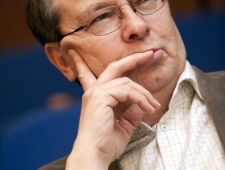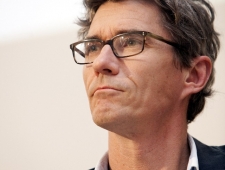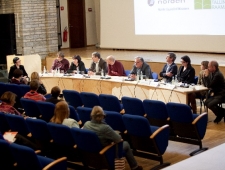The role of literature and its effects on society
A common thread throughout the forum's presentations was the alarming fact that fewer people are reading and how this is affecting their reading skills, their ability to understand texts and their further inclusion in society. There is a gap between those who thrive in the information society and those who do not participate at all. Experiences in Denmark describe deep structural changes in the market and readers. For example, 18% of the Danish adult population never read books and there is a decline in the total number of books being sold. There has, however, been an increase in the number of audio books and e-books sold. A further experience is that libraries have transformed from book banks to information centres. Similar experiences are to be found in Sweden, where every fifth boy is graduating from elementary school without being able to understand a simple newspaper article, which will lead to immense future problems for society.
In the Baltic States, there has been a decrease in financial support from the state for literature. In Latvia the overall cultural budget has decreased due to the economic crisis. However, Liāna Langa from Latvia stressed the importance of influencing politicians on the importance of literature in order to purchase books for libraries and schools, and to finance the translation and publication of books abroad. The Latvian case has proven successful, as government support has now increased. In Lithuania, there is a wide selection of literature and there has been an increase in the number of books being published every year. However, as in Latvia, the volume of books being published has not reached the level of before the recession.
- Hrafn Andrés Harðarson. Luuletaja, tõlkija ja Kopavoguri raamatukogu direktor
- Author: Terje Lepp/norden.ee
- Johan Unenge. Kirjanik, illustraator ja Rootsi lugemise saadik 2011-2013
- Author: Terje Lepp/norden.ee
Examples of how to communicate and promote literature
One successful example of how to inspire and encourage readers was given by the representative from Mariehamn City Library on the Åland Islands, Finland, where literature days are held every year. The event enables readers to meet and discuss things with authors and poets at public gatherings and seminars. The organizers of the Mariehamn Literature Days have seen that visitors find it most interesting to talk about their own reading experiences. Another example regarding communicating and promoting interest in literature and reading is the House of Literature in Oslo, Norway. The objective of communicating literature is both for education and entertainment, as well as to inspire a growing interest in reading. The House of Literature is furthermore an area for public gatherings and seminars on a range of topics.
The future of e-books was a highly debated topic during the forum. A question posted by Hrafn Andrés Harðarson was whether we have come to the end of libraries and printed books. The public's access to e-books is limited in Iceland, as in many other countries. Libraries in Iceland are not yet able to lend e-books due to copyright, technology and payment problems. Another issue is whether the same quality applies in the reading of e-books as it does in printed books. The solutions could be to apply the same regulations as with other books and to change attitudes towards changing technology.
Inspiring a growing interest in reading
The topic of the forum's final panel concerned the challenge of how to increase reading habits and inspire interest in literature among children and young people. A common understanding was that the problem is not what children read, but rather that children read at all. To increase reading, it is first of all important that literature is widely available. One part of the problem is that libraries have looked the same for a long time. Therefore, one aspect of solving the problem is to make it more exciting to go to libraries. The design of libraries must correspond to the interests of today's children.
A further solution is for parents to be more involved in the process and development of their children's reading, as well as for parents to take a greater role in telling children about their own reading experiences and how literature has had an impact on their lives. Another key factor concerned attitude and how the presentation of literature must focus on the positive aspects of reading. Role models are furthermore needed, for example celebrities or politicians, who could talk about their reading choices and what impact literature has had on their lives. Thereby, reading habits will be promoted in the media, which could lead to a change in attitudes.
Finally, children and youth need to be exposed to books in order to increase reading habits and to inspire interest in literature. Literature should be discussed in society as a whole and presented in innovative formats.
Further information on the Nordic Council's Children and Young People's Literature Prize
Find out more about the speakers here and read the presentations here. Click here to view pictures from the forum.





